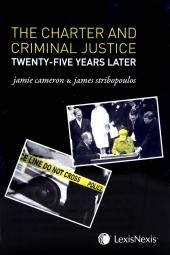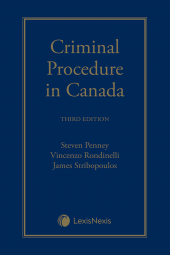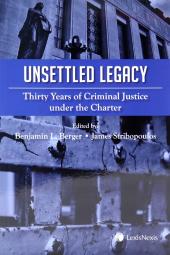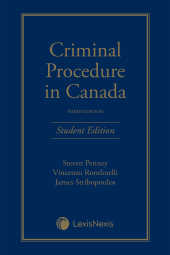The Charter and Criminal Justice - Twenty-five Years Later
One Year Subscription Only Terms
Subscribers receive the product(s) listed on the Order Form and any Updates made available during the annual subscription period. Shipping and handling fees are not included in the annual price.
Subscribers are advised of the number of Updates that were made to the particular publication the prior year. The number of Updates may vary due to developments in the law and other publishing issues, but subscribers may use this as a rough estimate of future shipments. Subscribers may call Customer Support at 800-833-9844 for additional information.
Subscribers may cancel this subscription by: calling Customer Support at 800-833-9844; emailing customer.support@lexisnexis.com; or returning the invoice marked 'CANCEL'.
If subscribers cancel within 30 days after the product is ordered or received and return the product at their expense, then they will receive a full credit of the price for the annual subscription.
If subscribers cancel between 31 and 60 days after the invoice date and return the product at their expense, then they will receive a 5/6th credit of the price for the annual subscription. No credit will be given for cancellations more than 60 days after the invoice date. To receive any credit, subscriber must return all product(s) shipped during the year at their expense within the applicable cancellation period listed above.
Product description
Canada's Foremost Criminal Law Experts Weigh In on the Charter's Impact on the Criminal Justice System
When the Charter of Rights and Freedoms turned twenty-five in 2007, Professors Jamie Cameron and James Stribopoulos organized a conference which brought together leading thinkers on the Charter and criminal justice. A strong faculty of academics, judges and practitioners debated and discussed the Charter's impact on criminal justice. The papers from this conference, which have now been edited by Professors Cameron and Stribopoulos, provide a fascinating look at how the Charter has changed the Canadian criminal law and the justice system.
Invaluable for Academics and Legal Professionals
Get expert analysis and insight on the ways the Charter has recalibrated the critical balance between the individual and the state in the criminal process. The Charter's impact on the definition of offences, detention and arrest, search and seizure, interrogation, the trial process and the rules of evidence are considered, as are the perspectives of those who are often left out - the young, aboriginals, victims and racialized minorities. Charter claims have become essential to criminal practice and this book not only considers those arguments that have been successful before the courts but also where the courts are headed in their treatment of this aspect of law.
Anyone with an interest in criminal or constitutional law will find this book an invaluable resource in gaining a sense of where we have been and, even more importantly, where we are going.
Features and Benefits
- Expert analysis of the latest trends in criminal constitutional law
- A variety of perspectives on the Charter from academics, judges, crown counsel and defence lawyers
- Novel approaches to consider, with new suggestions for untried arguments and creative uses of Charter guarantees
A Valuable Resource For
- Defence counsel seeking stronger Charter protection for their clients
- Crown counsel seeking to find balance between Charter claims and the public interest
- Academics reflecting on the Charter's profound impact and contemplating future trends
- Human rights advocates fighting for those who have remained largely on the margins, the young, aboriginals, victims and racialized minorities
Click here to read a review of this title
Table of contents
Justice Marc Rosenberg - Introduction
Don Stuart- Charter Standards for Investigative Powers: Have the Courts Got the Balance Right?
Michal Fairburn - Twenty-Five Years in Search of a Reasonable Approach
Croft Michaelson -The Limits of Privacy: Some Reflections on Section 8 of the Charter
Tim Quigley -The Impact of the Charter on the Law of Search and Seizure
Justice Casey Hill -Investigative Detention: A Search/Seizure by any Other Name?
Steven Coughlan-Arbitrary Detention: Whither - or Wither? - Section 9
James Stribopoulos - The Forgotten Right: Section 9 of the Charter, Its Purpose and Meaning
Lisa Dufraimont - The Common Law Confessions Rule in the Charter Era: Current Law and Future Directions
Steven Penney - Triggering the Right to Counsel: "Detention" and s. 10 of the Charter
Justice Gary T. Trotter - The Limits of Police Interrogation: The Limits of the Charter
David M. Paciocco - Charter Tracks: Twenty-Five Years of Constitutional Influence on the Criminal Trial Process and Rules of Evidence
Peter Sankoff - Rewriting the Charter of Rights and Freedoms: Four Suggestions Designed to Promote a Fairer Trial and Evidentiary Process
Christopher Sherrin- The Charter and Protection Against Wrongful Conviction: Good, Bad, or Irrelevant?
Hamish Stewart-Section 7 of the Charter and the Common Law Rules of Evidence
Alan Young-Done Nothing Wrong: Fundamental Justice and the Minimum Content of Criminal Law
Jamie Cameron - Fault and Punishment under Sections 7 and 12 of the Charter
Benjamin L. Berger - Moral Judgment, Criminal Law and the Constitutional Protection of Religion
Nicholas C. Bala-Youth as Victims and Offenders in the Criminal Justice System: A Charter Analysis – Recognizing Vulnerability
Joan M. Barrett-Expanding Victims' Rights in the Charter Era and Beyond
David M. Tanovich - The Charter of Whiteness: Twenty-Five Years of Maintaining
Racial Injustice in the Canadian Criminal Justice System
Jonathan Rudin- Aboriginal Over-Representation and R v. Gladue: Where We Were, Where We Are and Where We Might Be Going
Kent Roach - A Charter Reality Check: How Relevant is the Charter to the Justness of our Criminal Justice System?
 Lexis Nexis
Lexis Nexis 


